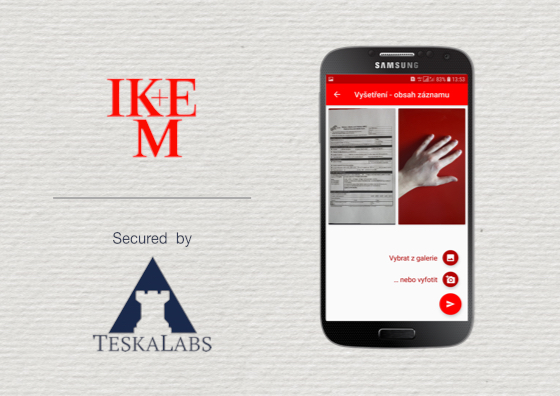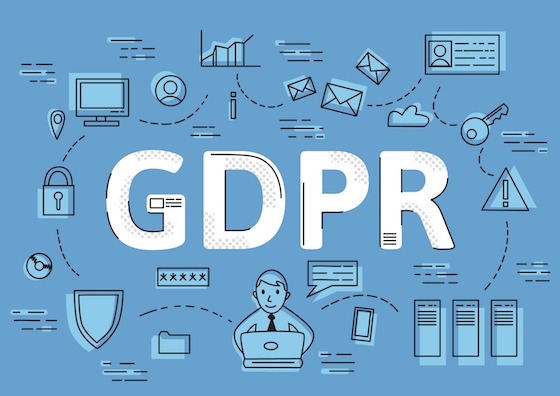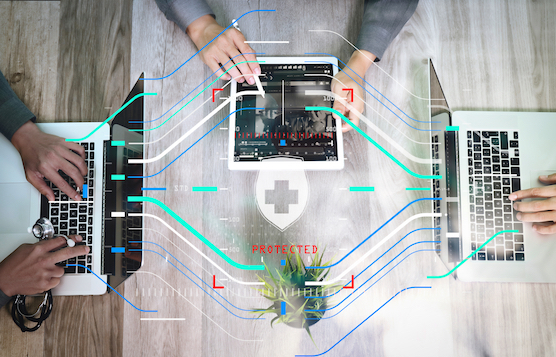
TeskaLabs has become a leader of Mobile Healthcare applications in the Health (in) Future Platform
English
Cellphone instead of a filing cabinet
Until quite recently, doctors at the IKEM hospital in Prague needed to perform photo documentation by first taking pictures with a digital camera, and then downloading and/or uploading them via a computer network to patient cards. A solution to this tedious and time-consuming practice was made possible through the use of mobile scanning technology. It works on a typical smartphone, is connected to the hospital’s database of patients, and hospital staff can download and upload images directly from it. This saves all involved staff a significant amount time.
The application was developed in a direct cooperation between hospital staff and external supplier, thus employ a simple user interface for the medical staff. The application contains very sensitive data, and therefore cyber-security is a very important element. IKEM decided to secure the application by employing TeskaLabs' cyber security platform SeaCat. SeaCat covers all cyber security and regulatory requirements, and moreover, it's very easy to integrate.
Building upon these improvements in patient care, the hospital has shown interest in developing further electronic assistants on its own. By utilizing open source, these digital products can be adopted and further developed by other interested parties.
Open-source mobile healthcare applications were the topic of the first in a series of workshops on the topic of the Health (in) Future Platform, held on Wednesday, October 2. This workshp was organised by TeskaLabs, a newly appointed leader of the (Open-source) Mobile Healthcare Applications.
Key take-aways from the first workshop:
- Security is the key to healthcare applications. Biometric access control and Hardware Security Modules now available in modern mobile phones, brings new possibilities.
- There are 400,000 software applications already in use in the medical industry today, and so finding ways of adapting these existing technologies to mobile applications is a viable alternative to building costly new applications from the ground up.
- A huge number of data management applications are being created today. But they are often not compatible, and so consequently, unusable. (For example, each hospital department uses a different type of form.)
- Data quality is a bigger problem today for the development of artificial intelligence than creating algorithms to “learn” on this data.
- Psychiatry offers one of the greatest opportunities for mobile and telemedicine growth in distance treatment.
Česky
TeskaLabs se stalo lídrem tématu mobilních zdravotnických aplikacích v platformě Zdravotnictví (v) budoucnosti
Mobil místo kartotéky
Dříve lékaři v pražském IKEM pořizovali fotodokumentaci tak, že udělali snímky na digitální fotoaparát, pak je stahovali a nahrávali ke kartám pacientů.
Konec zdlouhavé a kostrbaté praxi učinila aplikace zScanner. Funguje v mobilním telefonu, je napojena na nemocniční databázi pacientů, může z něj snímky stahovat i do něj nahrávat. Šetří tak výrazně čas. Snad ještě větší ohlas než u samotných lékařů měla trochu překvapivě u sester. Je z dílny externího dodavatele, ale vznikala v přímé spolupráci se zdravotníky, má jednoduché rozhraní, auditované zabezpečení, přihlašování pomocí biometrických údajů.
Nemocnici se natolik osvědčila, že už si další podobné elektronické pomocníky vyvíjí sama. A rozhodla se pro open source. Na její digitální produkty mohou navazovat a rozvíjet je další zájemci.
Open source mobilní aplikace pro zdravotnictví byly tématem prvního ze série workshopů platformy Zdravotnictví (v) budoucnosti, který se konal ve středu 2. října.
Inspirace, aneb co také zaznělo:
- Klíčové je pro aplikace ve zdravotnictví zabezpečení. Nové možnosti přináší biometrické ověřování přístupu, kterým disponují moderní mobilní telefony.
- Na světě je dnes 400 tisíc zdravotnických aplikací, možná jednodušší, než něco od základů vymýšlet, je inspirovat se.
- Aplikací pro správu dat dnes vzniká obrovské množství. Ale často nejsou konzistentní a následně využitelná. Například každé nemocniční oddělení využívá jiný typ formuláře.
- Kvalita dat je dnes pro vývoj umělé inteligence větší problém než tvorba algoritmů, které se na těchto datech mají „učit“.
- Chybí aplikace pro samotné zdravotnické služby. Ty ovšem musí mít pro praktické využití stejné schválení jako lék.
- Největší příležitosti pro léčbu na dálku skýtá psychiatrie.
Napsal David Mařík, Coverstory
Most Recent Articles
You Might Be Interested in Reading These Articles

zScanner: mobile app for medical photo documentation with security by TeskaLabs
zScanner is a mobile application for clinical and medical photo documentation. zScanner enables doctors to take photos of patient medical records, and of injuries of the patients, and upload them to a hospital information system. zScanner is an application developed and used by IKEM, a major Czech hospital, and the largest center of clinical and experimental medicine in the Czech Republic.
Published on May 12, 2019

Personal Data Deindetification: Homomorphic encryption
Homomorphic encryption is a special type of encryption invented by IBM. Encryption is a critical part of GDPR compliance although there are no explicit GDPR encryption requirements. The regulation vaguely states that businesses must enforce safeguards and security measures to protect all consumer data that they handle. The GDPR refers to pseudonymization and encryption as “appropriate technical and organizational measures.
Published on June 14, 2018

9 Ways To Improve Cybersecurity In Healthcare
Modern healthcare is deeply intertwined with technology. From the sophisticated machines used for diagnosing disease to the enterprise systems that store patient records, it is extremely difficult to run any healthcare organization today without heavily relying on information technology.
medicat
healthcare
data-privacy
Published on November 10, 2018